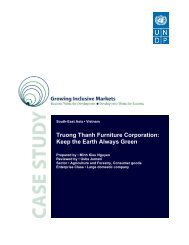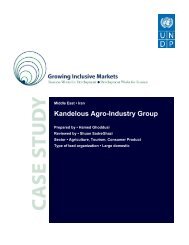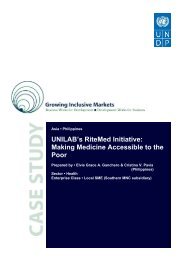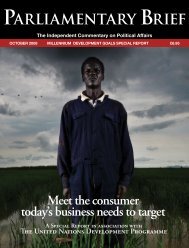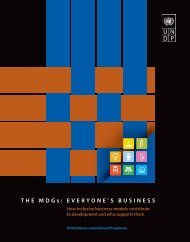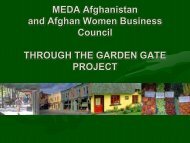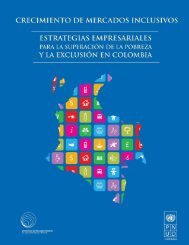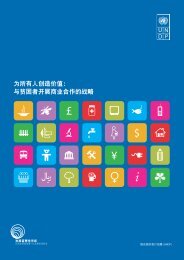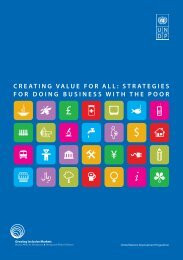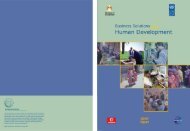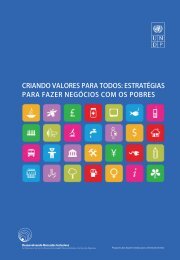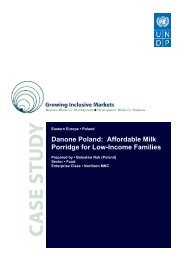Edipack: a Paper Recycling Pioneer - Growing Inclusive Markets
Edipack: a Paper Recycling Pioneer - Growing Inclusive Markets
Edipack: a Paper Recycling Pioneer - Growing Inclusive Markets
Create successful ePaper yourself
Turn your PDF publications into a flip-book with our unique Google optimized e-Paper software.
producing recycled paper packaging for watermelon exports and plans to continue branchingout into the packaging industry for the agricultural sector. The business is also expandinginto the production of more advanced packaging - in December 2009 it concluded a contractwith Tirana beer for bottled beverages, which require high quality offset printing solutions.<strong>Edipack</strong> currently has around 370 clients – including producers of packaging materials, towhom it provides corrugated paper. These clients include a range of SMEs as well as largefirms such as furniture exporters, shoe exporters, beer producers and agricultural exporters.Agriculture is becoming one of <strong>Edipack</strong>’s bigger target markets after a successful debut inpackaging for 30-trucks worth of watermelons that were exported to Great Britain. 23External ActorsExternal actors were crucial to the success of <strong>Edipack</strong>. Since paper recycling efforts did notpreviously exist in Albania, the new business caught the attention of several internationalorganizations. Organizations such as the International Finance Corporation (IFC) and theUnited States Agency for International Development (USAID) supported <strong>Edipack</strong> mainlythrough the provision of market data, business planning and training. 24 The European Bankfor Reconstruction and Development (EBRD) invested in a €2 million equity stake in Mr.Balteza’s business in 2007, providing not only the funds necessary to scale up his businessbut also valuable advice on how to make the business more efficient and profitable. 25 Forinstance, EBRD is advising the company on how to reduce energy costs through theintroduction of new technologies. Currently, energy costs account for almost 50% of the totalproduction costs faced by <strong>Edipack</strong>. Through the introduction of new technologies, EBRD isexamining the possibility of reducing those costs to 15-20% of total production costs. 26Recycled paper production is capital intensive and requires large investments in machinery.While the company started producing recycled paper even before development actors werebrought in, it had outstanding loans from a Greek commercial bank that it had troublerepaying. 27 At that point, Mr. Balteza reached out to the IFC, which was creating a newassociation of recyclers to co-finance his business. The IFC at the time found his project toosmall and too risky for their involvement. However, Mr. Balteza’s enthusiasm andcommitment convinced the IFC to provide him with market data that helped him assess themarket potential for recycling. The IFC also assisted <strong>Edipack</strong> in the development of abusiness plan, without which external financing would have been difficult to obtain. <strong>Edipack</strong>only paid approximately 30 percent of the total cost of IFC’s services. With the help of IFC’sadvisory services, <strong>Edipack</strong> was able to attract €6.8 million of new investments for its businessexpansion as detailed below. 2823 Balteza, B. (2009, August 11, interviewed by I. Kleinova, & B. Duerr).24 Balteza, July 2009.25 (Braterman & Xhunga, 2009).26 Balteza, December 2009.27 Ibid.28 Ibid.Caselet • <strong>Edipack</strong>: a <strong>Paper</strong> <strong>Recycling</strong> <strong>Pioneer</strong> 6



